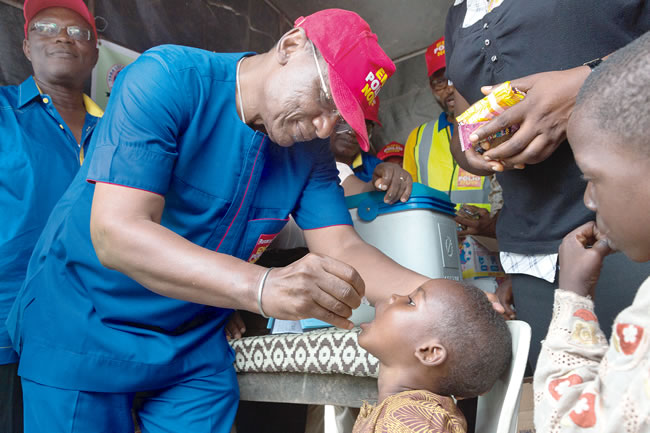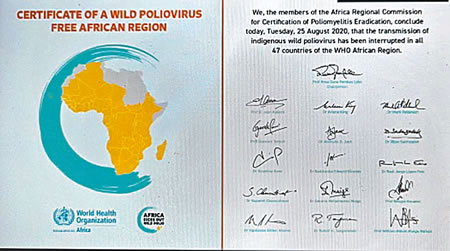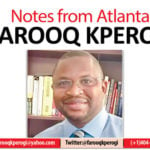WHO’s Africa Regional Certification Commission (ARCC) on Tuesday declared Nigeria and the rest of Africa free of wild poliovirus. The milestone came four years after Nigeria – the last polio-endemic country in Africa – recorded its final case of wild poliovirus following decades of efforts by WHO, Rotary International, local and national leaders, and health workers throughout the WHO African region. In this interview by Bioluwatife Akinyemi, the chair of Rotary’s Nigeria National PolioPlus Committee, Dr Tunji Funsho, speaks on how Rotary contributed to the eradication of polio virus in Nigera and the rest of Africa. Excerpt:
Nigeria was announced as one of the countries that is polio-free in the world. Can you highlight the roles played by Rotary Nigeria, WHO, UNICEF and other partners, in eradicating polio in Nigeria and Africa as a whole?
Nigeria’s confirmation as a wild polio-free country within the WHO African region has been crucial to this milestone. Nigeria was actually the last wild polio-endemic country in Africa, and after it passed three consecutive years without any trace of wild poliovirus in August 2019, it became possible for the official certification process for the entire WHO African region to begin.
Since 1988—when we became a founding partner in the Global Polio Eradication Initiative (GPEI), along with the World Health Organisation (WHO), UNICEF, and the U.S. Centers for Disease Control and Prevention—our goal has been global polio eradication as the partnership’s name implies. The Bill & Melinda Gates Foundation and Gavi, the Vaccine Alliance later joined our efforts, and of course, focusing on Africa (and Nigeria within the continent) was a priority.
Within this partnership, all the members have played a critical role in the African region’s wild polio-free certification.
Broadly speaking, Rotary’s roles in the GPEI are fundraising, advocacy, raising awareness and mobilising volunteers; the World Health Organization (WHO) coordinates the strategy, management and administrative processes of the GPEI. The U.S. Centers for Disease Control and Prevention (CDC) conducts research and supplies scientific and technical expertise to the GPEI UNICEF procures and distributes polio vaccines. The Bill & Melinda Gates Foundation contributes technical and financial resources and galvanizes fiscal and political support for polio eradication efforts. And Gavi, the Vaccine Alliance, helps to strengthen health systems, including routine immunisation services.
Rotary members in Nigeria and around the world worked to raise funds for polio eradication in the region (to date, Rotary and its members have contributed nearly $890 million to support polio eradication activities in the African region); secure the support of world governments and national and local leaders; hold events and fundraisers for World Polio Day (24 October); and generally raise awareness about the importance of polio eradication and immunizations.
You must be referencing the August 2016 outbreak of wild polio in Borno State. To summarize, after more than two years without detecting wild polio in Nigeria, four cases of wild polio were reported in three different areas that were previously inaccessible to health programmes and workers (including polio vaccinators) due to unrest, and the affected children were paralysed.
To address this setback, Rotary and its GPEI partners launched a coordinated multi-country and inter-state outbreak response plan to protect against international spread, rapidly raising children’s immunity to the poliovirus in Borno, bordering states in Nigeria, and countries in the Lake Chad region, including Niger, Chad, Cameroon and the Central African Republic. The frontline programmes workers figured out how to deliver immunisations to inaccessible areas, and for example, mapped the many islands in Lake Chad and traveled hours by canoe to reach hundreds of settlements for the first time.
Following the outbreak, improved surveillance (detection of the poliovirus in humans and the environment) became a priority, and the GPEI began to employ better protocols via app-based electronic tools such as AVADAR and e-Surve. These electronic surveillance apps offer an improved approach for active surveillance and monitoring of disease outbreaks, as those engaged in monitoring can input data into an app, allowing for quick, accurate, and up-to-date data collection. These tools have allowed us to understand when the virus has actually been eliminated from an area, and when we can accurately declare success.
It was announced that the Muhammadu Buhari administration earmarked the sum of $50 million in 2015 for eradication of polio in the country and likewise $90 million dollars in 2016 and a good amount of money in subsequent years. How much have you spent in total in Nigeria and some parts of Africa?
Rotary has contributed more than $2.1 billion to fight polio around the world. And, as noted in the first question, Rotary and its members have contributed nearly US$890 million to support polio eradication activities in the African region, of which $276 million was dedicated to Nigeria.
That said, Rotary is focused on raising $50 million per year—as every dollar donated to Rotary’s PolioPlus fund is matched with two additional dollars from the Gates Foundation–so we can continue to keep children protected in Africa and eliminate the wild poliovirus in Afghanistan and Pakistan.
How many people were involved in executing your project?
More than one million Rotary members have donated their time and money to eradicate polio, and every year, hundreds of members work with health workers to vaccinate children in countries affected by polio.
PolioPlus Nigeria, the programme that I oversee, is the Nigeria-based arm of Rotary’s PolioPlus programme. Thousands of Rotary members in Nigeria have played a role in ensuring that Rotary’s polio eradication efforts in the country are effective and receive necessary funding. Rotary members in Nigeria serve as volunteer immunisers, hold fundraisers, and with key government, business and community leaders advocate for the eradication of polio and work to achieve the objectives of the Expanded Programme on Immunisation and to inform them of Rotary’s PolioPlus activities and goals.
In Nigeria specifically, there are 402 Rotary clubs and more than 10,550 Rotary members. Many of these members work closely with Rotary members from around the world who regularly travel to Nigeria to join them in immunising children against polio during the country’s National Immunization Days.
What are the plans on ground to address possible records of polio in Nigeria in coming months?
While success in eliminating the wild poliovirus throughout the WHO African region is proof that with strong commitment, coordination and perseverance, polio eradication is possible, our work is not done.
The wild poliovirus continues to circulate in parts of Pakistan and Afghanistan and so we remain focused on vaccinating every last child, and strengthening routine immunisation to keep immunity levels high so the virus does not return to Africa.
Within that framework, we are also working to ensure that funding for the African region continues so that we can continue immunisation activities as well as maintain polio surveillance operations.
Apart from making an announcement on this major milestone, what are the things Nigerians should expect from your group for this year’s commemoration of World Polio Day?
Every year, thousands of Rotary members all over the world hold events and fundraisers for World Polio Day (24 October), and we will be using this year as another opportunity to celebrate the African region’s wild poliovirus-free certification.
Every year, on World Polio Day, Rotary hosts a virtual event to provide an update on the global status of polio eradication, and so we will encourage our members and the public to take part in this event. Anyone can take part in World Polio Day.
We will also use this year’s World Polio Day celebration as an opportunity to encourage our members and the public to become a part of the fight to eradicate polio by making donations. As mentioned above, every dollar donated to Rotary’s PolioPlus fund is matched 2-to-1 by our partners at the Bill & Melinda Gates Foundation.
What plans do you have for other to serious diseases?
Rotary and our GPEI partners remain focused on ending polio for good, as we have been for more than 30 years. I’m optimistic that the end of polio is within our grasp—I firmly believe that polio will be the second disease eradicated (after smallpox) — but we must remain committed to rallying global political and financial support in order to push towards a polio-free world.
YOU SHOULD NOT MISS THESE HEADLINES FROM NIGERIAN TRIBUNE
CBN Pegs Exchange Rate At 386/$
Central Bank of Nigeria (CBN) has pegged naira exchange rate at 386 units to the United States dollar as it plans to resume weekly forex sales to Bureau de Change operators from August 31. In a circular signed by O.S. Nnaji, director of trade and exchange department, the apex bank said its decision to resume FX sales to BDCs is to enhance accessibility to forex “particularly to travellers” since the resumption date for international…
Council Of State Pardons Ex-Gov Ambrose Alli, Three Others
The Council of State has ratified the presidential pardon extended to late former Bendel State Governor, Prof. Ambrose Alli and three others. The meeting presided over by President Muhammadu Buhari at the presidential villa, Abuja on Thursday also ratified the pardon granted to Col Moses Effiong, Major E.J Olarenwaju and…
Blasphemy: I Will Not Hesitate To Sign Death Warrant If Yahya Sharif Fails To Appeal, Says Ganduje
Kano State governor, Abdullahi Umar Ganduje, has said he would not hesitate to sign the death warrant passed on Kano-based singer, Yahya Aminu Sharif if he fails to appeal the judgment. This was just as governor Ganduje said the state government has accepted the judgement passed on Sharif and is ready to abide by it. However, the Nigerian constitution gives the right of appeal to Shariff…
Southern Kaduna Crisis: We Won’t Sweep Issues Under Carpet ― Osinbajo
Vice President Yemi Osinbajo has assured that the Federal Government will not sweep the major issues underlying the conflict in Southern Kaduna under the carpet so as to effectively deal with the situation. Speaking, on Thursday, at the ongoing Nigeria Bar Association Annual General Conference during a Special Conversation, he identified the major issues to include “ensuring justice, fixing economic marginalisation and the…
Details Emerge Of How Akinwumi Adesina Got 100% Votes For Second Term As AfDB President
Dr Akinwumi Adesina was on Thursday unanimously endorsed by all the 81-member countries of African Development Bank (AfDB) for another term of five years as the 55th annual meetings of the bank ended in Cote d’Ivoire. A globally-renowned development economist and a World Food Prize Laureate and Sunhak Peace Prize Laureate, Dr Adesina has distinguished himself in driving a bold agenda to reform the Bank and accelerate …







